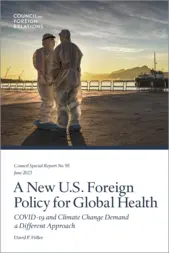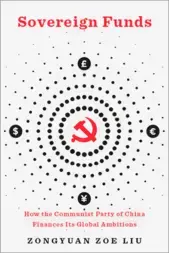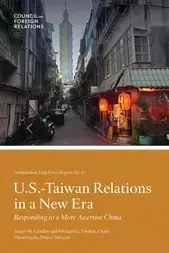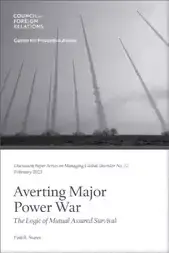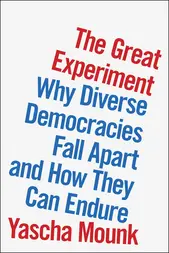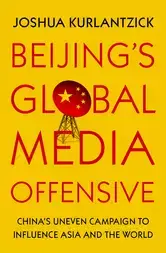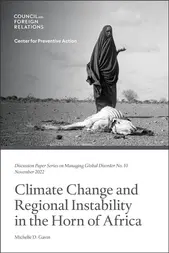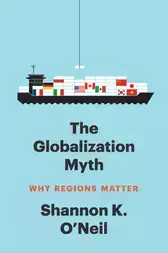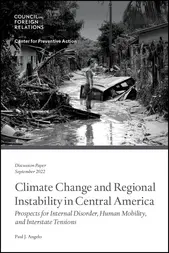Books & Reports
-
The United States should treat pandemics and global warming as apex health threats to its national interests, argues David P. Fidler.
-
Sessions were held on the future of AI governance, accountability for war crimes in the invasion of Ukraine, reworking the Sustainable Development Goals and the global development model, revitalizing the World Trade Organization, and strengthening the global geopolitical order.
-
The first in-depth account of the sudden growth of China’s sovereign wealth funds and their transformative impact on global markets, domestic and multinational businesses, and international politics.
-
Although a conflict in the Taiwan Strait has thus far been avoided, deterrence has dangerously eroded. To maintain peace, the United States must restore balance to a situation that has been allowed to tilt far too much in China’s favor.
-
I want to thank Chairman Wyden, Ranking Member Crapo, and the distinguished members of this committee for the opportunity to testify today. Tax avoidance by American pharmaceutical compan…
-
The countries on the Bay of Bengal already face some of the world’s most severe natural disasters, and climate change will likely make things worse. Sarang Shidore argues the United States should partner with regional organizations to increase mitigation efforts.
-
The health of millions stands to be harmed by climate change in the coming decades, but national governments and international organizations remain woefully underprepared. Elizabeth Willetts and Andy Haines suggest a path forward to bolter responsiveness and resilience.
-
Although no two major powers have openly fought in over three-quarters of a century, growing tensions between the United States, China, India, and Russia threaten renewed conflict. CFR’s Paul B. Stares argues a new logic—“mutual assured survival”—could keep the peace.
-
Public Health Threats and Pandemics
Zoonotic diseases, naturally transmissible between humans and animals, have posed a growing public health threat for decades. However, existing institutional arrangements have fallen short. The wide-ranging, large-scale, and costly effects of the COVID-19 pandemic demonstrate the value of addressing those weaknesses in global governance. -
Yascha Mounk offers a brilliant big-picture vision of the greatest challenge of modern time—how to bridge the bitter divides within diverse democracies enough for them to remain stable and functional.
-
Public Health Threats and Pandemics
Biotechnology advances offer immense public health and consumer potential, but come with serious risks. A recent workshop held by the Council on Foreign Relations brought experts together to discuss new forms of global governance to manage those risks. -
A provocative guide to how we must reenvision citizenship if American democracy is to survive.
-
Sessions were held on the future of international cooperation, managing geopolitics and emerging health threats in the post-COVID-19 era, supply chain resilience and regional economic initiatives, preventing conflict in the Indo-Pacific, pursuing a negotiated end to the war in Ukraine, and the future of energy, climate, and geopolitics.
-
For CFR’s annual Preventive Priorities Survey, U.S. foreign policy experts assessed the likelihood and impact of thirty potential conflicts that could emerge or escalate in 2023.
-
A robust examination of North Korean foreign policy under Kim Jong-un, including its domestic drivers, summitry diplomacy, and nuclear program.
-
Climate change has the potential to become the most significant threat to public health in the coming decades. Dr. Colin Carlson argues that new initiatives, including greater adaptation financing and robust public healthcare systems, are necessary to avoid disaster.
-
Joshua Kurlantzick analyzes China's attempts to become a media, information, and influence superpower, seeking for the first time to shape the domestic politics, local media, and information environments of the United States, East Asia, parts of Europe, and the broader world.
-
Rapid advancements in biotechnology could have massive implications for public health and the global economy. Ryan Morhard, director of policy and partnerships at Ginkgo Bioworks, outlines how global health security governance can keep pace.
-
The African countries of the Sahel stand to be among the most affected by climate change. To help mitigate its effects, Beza Tesfaye argues that the United States should partner with civil society groups and expand climate adaptation and financing efforts.
-
Climate change is exacerbating instability in the Horn of Africa. Democratizing climate awareness, respecting African energy needs, and supporting regional organizations are strategies to mitigate its effects.
-
Every viral pandemic since 1900 has been the result of spillover from animals to humans. Public health systems should take the steps outlined by Jay Varma and Neil Vora to limit the potential for spillover and the rapid spread of pathogens.
-
Shannon K. O’Neil offers a powerful case for why regionalization, not globalization, has been the biggest economic trend of the last forty years.
-
To stave off climate-induced instability in Central America, national governments and regional and international organizations all have a role to play to develop both immediate crisis response and long-term instability mitigation, argues Paul J. Angelo.
-
Ebenezer Obadare examines the overriding impact of Nigerian Pentecostal pastors on their churches, and how they have shaped the dynamics of state-society relations during the Fourth Republic.
 Online Store
Online Store

